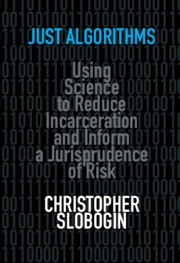Refine search
Actions for selected content:
2 results
5 - Downsizing Pretrial Detention
- from Part II - Adjudication
-
- Book:
- Rehabilitating Criminal Justice
- Published online:
- 17 April 2025
- Print publication:
- 24 April 2025, pp 75-82
-
- Chapter
- Export citation

Just Algorithms
- Using Science to Reduce Incarceration and Inform a Jurisprudence of Risk
-
- Published online:
- 09 July 2021
- Print publication:
- 29 July 2021
